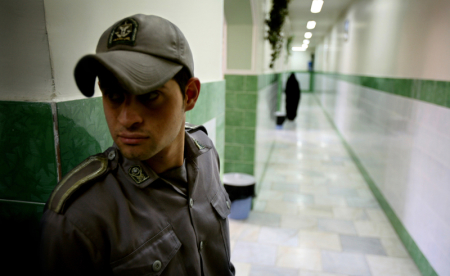Muslim Iranian Interrogator Persecuting Christians Gives Life to Christ After Christian Prisoner in Solitary Confinement Shares Gospel

An Iranian interrogator involved in the persecution of religious minorities gave his life to Jesus Christ after a Christian woman locked in solitary confinement for three days shared the Gospel with him.
The woman, a house church leader named Noushin, was arrested for her faith and forced into solitary confinement, according to Open Doors USA, an organization that aids persecuted Christians throughout the world.
"I wasn't ready to go to prison," said Noushin to Open Doors. "I knew it was a dirty place, a place where people are tortured and locked up in solitary confinement. I was afraid that I would be so fearful that I would give up all the names of the members of house church. I even feared that I would deny my faith if they tortured me."
During her imprisonment, however, she shared the Gospel with her interrogator after three days of being locked in solitary confinement.
"We talked about Jesus for hours until finally the interrogator gave his heart to Jesus. We prayed together," said Noushin.
"It's an honor for me to talk about Jesus," Noushin told the guard. "You also need Jesus in your life. I cannot be indifferent toward you. I want you to experience the joy and blessing of salvation. I can't keep silent about this."
The preaching of the Gospel is still happening in the predominantly Muslim nation despite immense opposition from the the regime led by President Hassan Rouhani that has imprisoned more religious minorities than previous ones since he was elected in 2013.
The Rouhani regime has led to poor religious freedom conditions and with that has come the imprisonment of various religious minorities, including Christian converts, Sunni Muslims, Sufi Muslims and dissenting Shiite Muslims, according to a report from the U.S. Commission on International Religious Freedom.
"The government of Iran continues to engage in systematic, ongoing, and egregious violations of religious freedom, including prolonged detention, torture, and executions based primarily or entirely upon the religion of the accused," said the report.
Iran has been identified by the State Department as a "country of particular concern," regarding religious freedom since 1999, and in July 2014 USCIRF again recommended that Iran be designated a CPC.
Much of this religious persecution has been directed toward Christians and house churches, according to Open Doors.
The Islamic Republic of Iran proclaims that Twelver (Shiite) Jaafari School of Islam is its official religion and its constitution recognizes Christians, Jews, and Zoroastrians as protected religious minorities. Religious persecution, however, has been an ongoing problem and has been of particular concern since the 1979 revolution when members of religious minorities fled the country in fear of being arrested and killed.
"The [Iranian] government continues to use its religious laws to silence reformers, including human rights defenders and journalists, for exercising their internationally-protected rights to freedom of expression and religion or belief," explained the USCIRF's latest report.






















